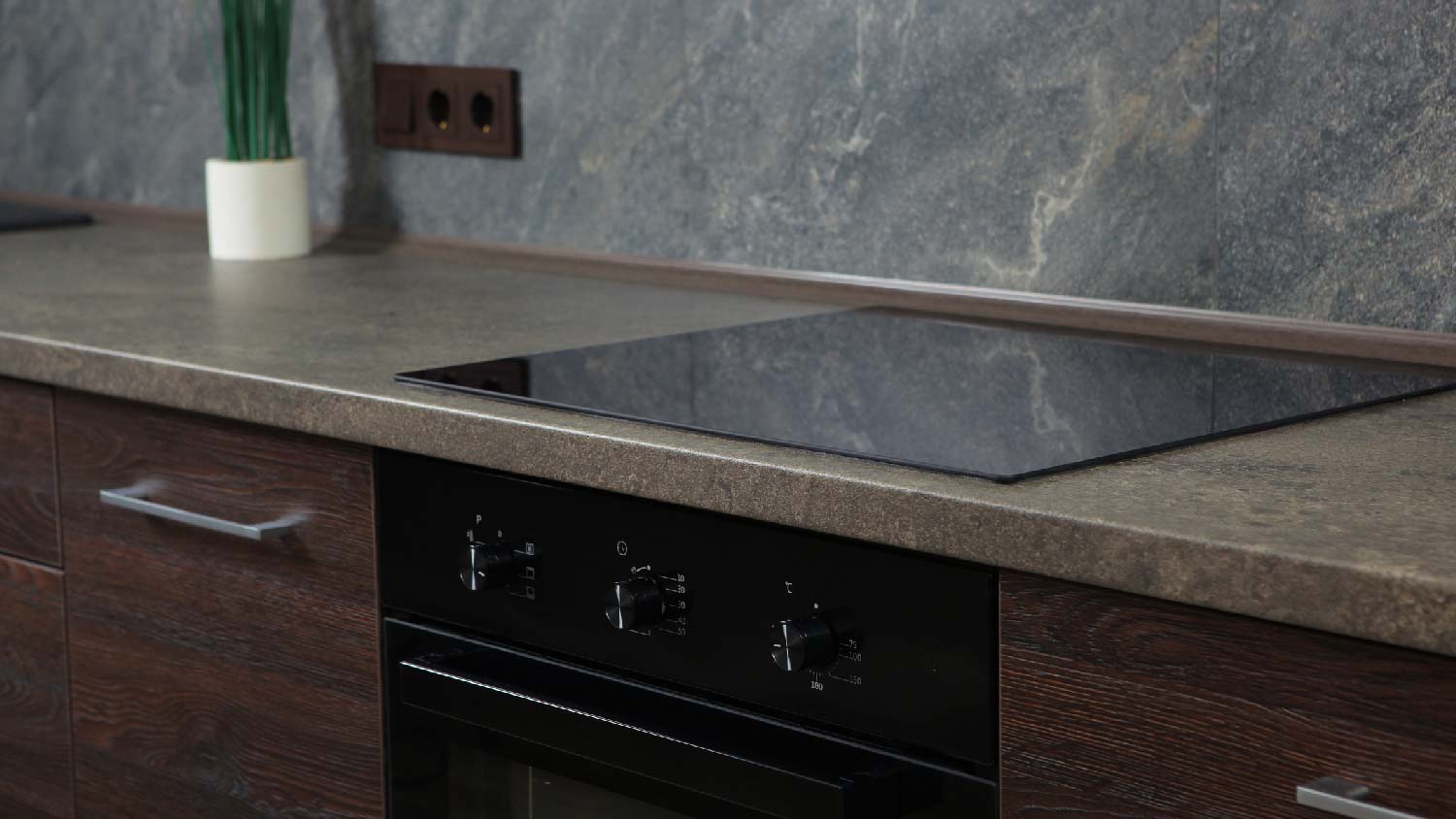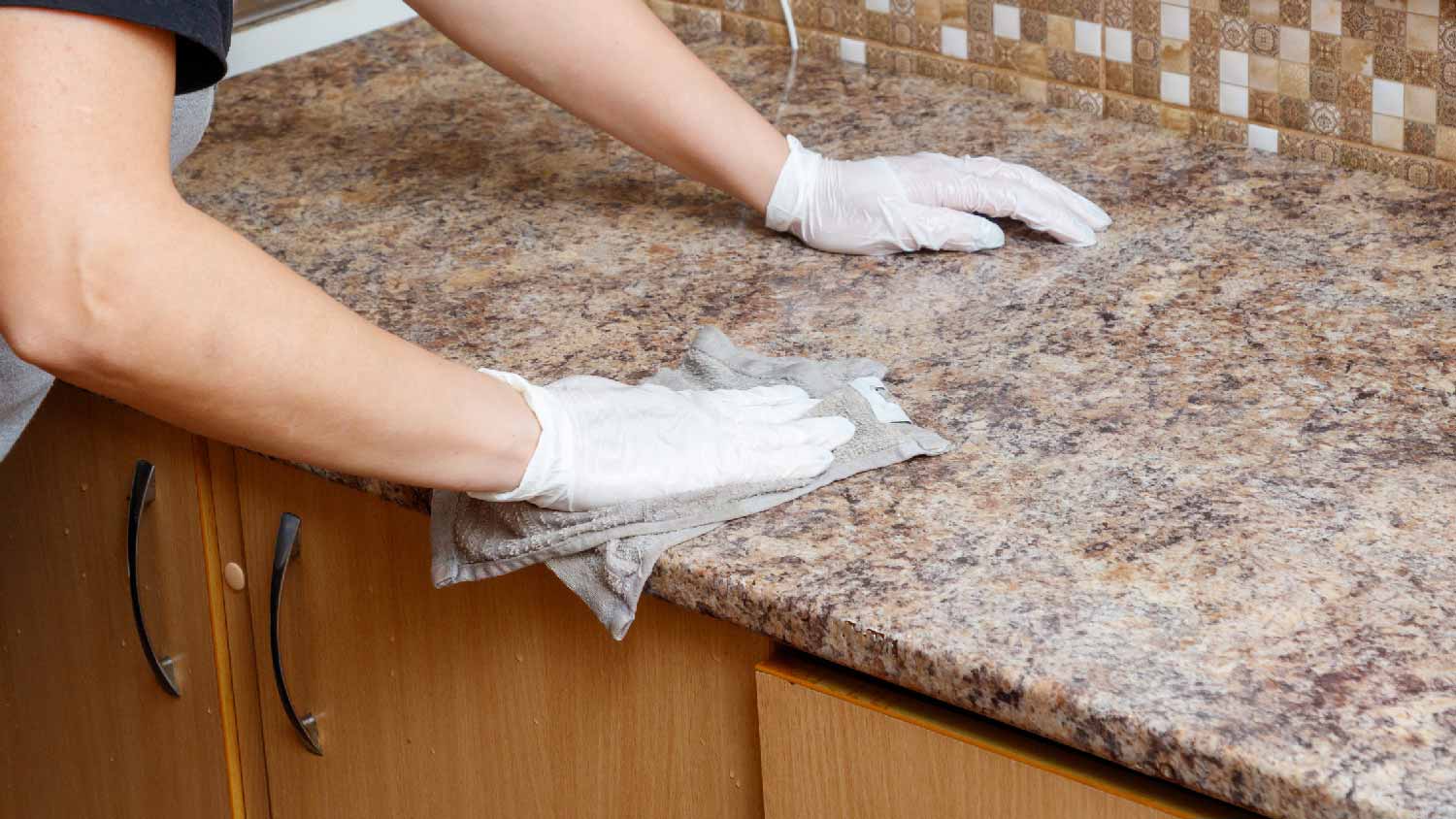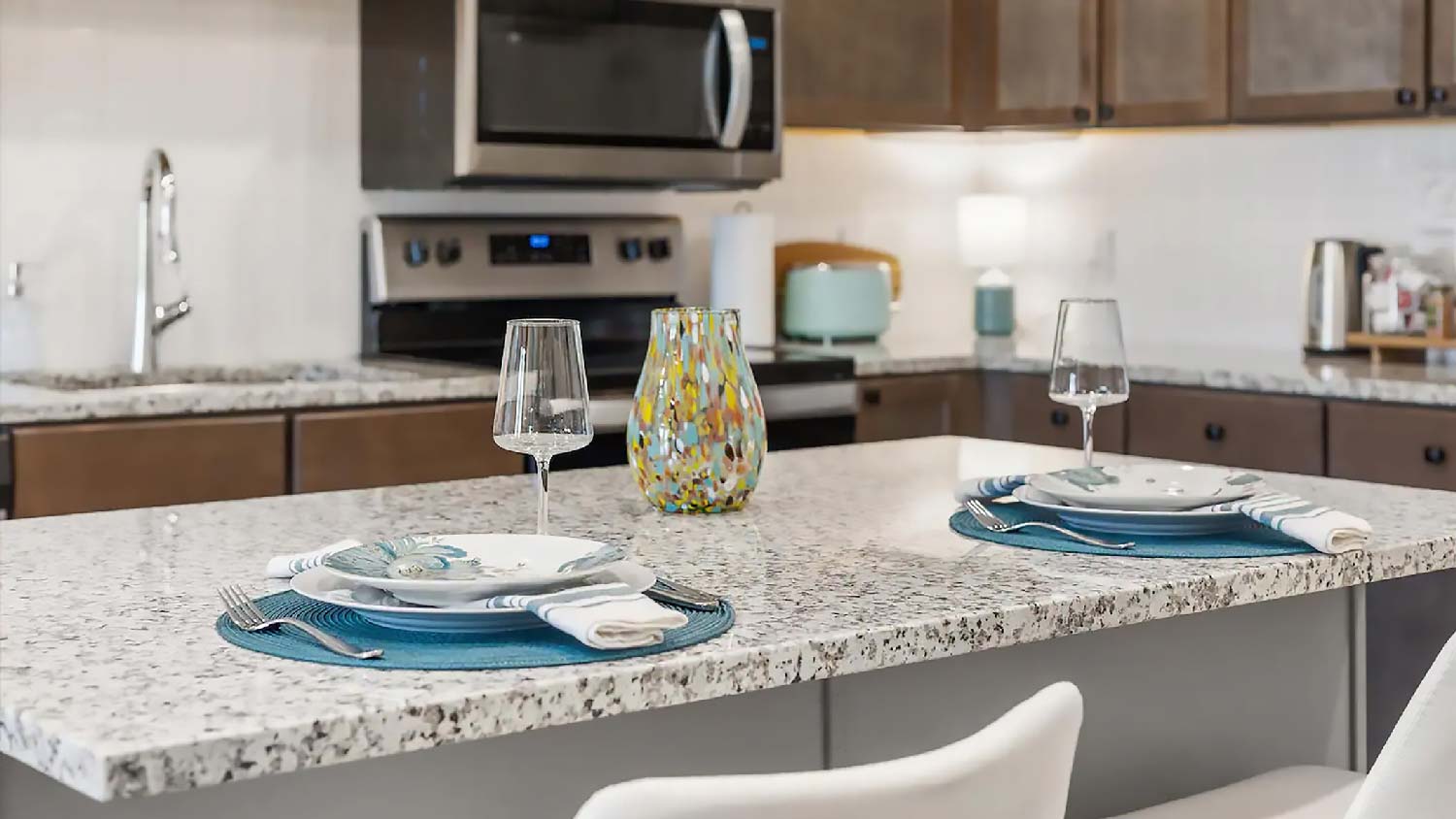How to Seal Granite Countertops: Tips, Steps, and Why It Matters
Seal the deal on an immaculate kitchen


Granite countertops are a popular choice in kitchens because of their durability and the numerous color options to match most aesthetics. But unsealed granite is susceptible to staining and damage, quickly turning your high-end kitchen into a dirty mess. This guide explains how to seal granite countertops properly to keep your kitchen looking fresh.
Why Do I Need to Seal Granite Countertops?

There are many notable benefits of granite countertops, including durability, sustainability, and heat resistance. However, sealing them is necessary to keep them looking good for longer. Granite is a porous stone that can soak up liquids if improperly sealed. A small spill—especially something dark-colored like red wine, grape juice, or coffee—can become a permanent stain.
Experts recommend sealing granite countertops every one to five years to keep the surface stain-resistant and durable. Regularly sealing the countertops helps the surface maintain its sheen, prevents the stone countertop from etching, and stops spills from turning into stains.
How Much Does It Cost to Seal Granite Countertops?
On average, granite countertops cost $100 or more to seal when a professional installs them. Maintenance sealing will cost less; all you’ll need is the sealant, which can cost as little as $15, and microfiber cloths to apply the sealant and wipe off any excess product.
How to Tell If Granite Countertops Need Sealing
Here’s a simple test to check the surface’s seal: In an inconspicuous area, pour a small amount of water in one spot and a small amount of oil in another. Leave the liquids on the countertop for 15 minutes, then check back. If you notice a dark stain or ring around the spill, the countertop isn’t properly sealed. If the liquid sits on top of the counter and doesn’t leave a mark when wiped away, the countertop is sealed adequately.
How to Seal Granite Countertops

These tips will help you restore the surface to its former glory.
1. Choose Your Sealant
There are two sealant types to consider: water-based and solvent-based.
Water-based sealants are the more eco-friendly option as they contain fewer volatile organic compounds (VOCs) than solvent-based sealants, but on the flip side, they need to be reapplied more frequently (every six to 12 months). They are also the most affordable option.
Solvent-based sealants are longer-lasting than water-based and may not require reapplication for five to 10 years because they’re better at penetrating the granite. They are more expensive, but the cost may be comparable over time. Solvent-based sealants can emit a strong odor because they contain more VOCs, which makes them less eco-friendly than water solvents. Open windows when applying solvent-based sealants to limit the amount of VOCs you inhale.
2. Clean the Countertop
The countertop must be completely clean and dry before you apply the sealant. To clean granite countertops, wipe away any debris, then wash it thoroughly with warm water and dish soap. Use a scrubbing sponge to clean any stuck-on grime. Wipe the countertop thoroughly with a microfiber cloth and repeat the process until the cloth is completely clean after wiping.
3. Perform a Test
The next step is to test your chosen sealant in an inconspicuous countertop area, like a hidden corner. Apply a small amount of sealant to this area and wait 15 to 20 minutes to let it absorb into the granite. If the area looks good, apply the sealant to the entire countertop surface. However, if the test area appears discolored, it's best to try a different sealant.
4. Apply the Sealant
Using a microfiber cloth, apply the sealant to the countertop in a circular motion to work it into the granite’s grains. Leave the sealant on the countertop for the amount of time the manufacturer recommends and let it fully permeate the surface. Then, wipe off any excess sealant with a clean, dry cloth. If the sealant requires a second coat, repeat the entire process.
5. Let It Cure
Check the sealant’s label to see how long the manufacturer recommends letting the surface cure before using it. The manufacturer may say to wait as little as two hours or as much as 48 hours. However, granite countertop experts recommend waiting as long as possible to let the surface cure, so leave it for two full days if possible.
Taking Care of Granite Countertops

Granite countertops are durable and attractive, but you must take proper care of them to keep them that way. Here’s how to keep your countertops in tip-top shape.
Wipe spills up immediately with a microfiber cloth.
Remove sticky stains by dipping a cloth in hot water, placing it on the stain, letting it sit, and wiping it away with a clean cloth.
Clean the surface regularly using a soft cloth and a cleaner designed for granite countertops.
Make a kitchen cleaning checklist to ensure you keep up with countertop maintenance.
Protect the surface by using placemats and coasters for dinner plates and drinks.
Use hot pads or trivets underneath hot pans to prevent burn marks.
Use chopping boards for food prep, and never chop items directly on the granite.
Avoid using acidic cleaners like lemon juice or vinegar, as these can damage the surface.
Seal the countertops every six months to five years, depending on the type of sealant you use.
DIY vs. Hiring a Pro to Seal Granite Countertops
Sealing granite countertops is a DIY-friendly project. Granite countertop sealant costs between $15 to $65, depending on whether you choose a more affordable water-based sealant or a higher-priced solvent-based one. The sealant and a microfiber cloth are all you need for this project.
However, you can hire a pro to seal your countertops if you prefer. A stone countertop pro near you can recommend the best sealant for your countertop and apply it correctly. While in your home, they can also perform any necessary repairs on your countertop. Granite countertop repairs cost between $200 and $1,200, depending on the type and extent of the damage. The pro might recommend replacing your countertops if the damage is severe.
Frequently Asked Questions
Unsealed granite is more susceptible to staining and other damage. Regularly sealing your granite countertops decreases the chances you’ll need to repair damaged countertops in the future. It also keeps it looking shiny rather than becoming dull over time. You can check whether your granite needs resealing by putting a few drops of water on the counter and waiting 15 minutes to see whether the water permeates the surface.
The frequency at which granite countertops must be resealed depends on the type of sealant used. Water-based sealants may need reapplication every six months to one year, while solvent-based sealants can last five to 10 years before resealing. If you’re unsure whether your countertops need resealing, you can test them yourself or hire a pro to inspect them.
There are several pros and cons of granite countertops, but one of the main advantages is their heat resistance. You can put a hot pan directly on a granite countertop, and it is unlikely to leave a mark. However, it’s a good idea to use a hot pad or trivet under a hot pan anyway; the heat could damage the surface if it’s not sealed well, and it can cause the countertop to heat up and burn anyone who touches it too soon.





- How Long Do Granite Countertops Last?
- How to Change the Color of Your Granite Countertops for a Brighter Kitchen
- How to Choose Between Epoxy vs. Granite Countertops: Everything You Should Consider
- Sink Your Teeth Into Granite Sink Cutouts
- How To Paint Countertops: A Step-by-Step Guide
- How to Cut Countertops for a DIY Kitchen Reno
- How to Epoxy Countertops in 8 Steps
- Do Quartz Countertops Need to Be Sealed? Find Out the Answer
- Laminate Countertop Pros and Cons
- How to Cut Laminate Countertops Like a Pro










